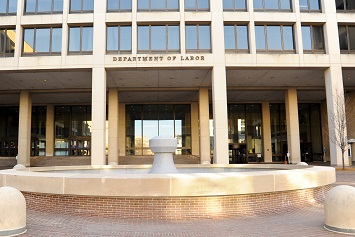President Donald J. Trump will nominate Eugene Scalia to be Secretary of Labor, the president announced July 18 on Twitter. The White House has not yet confirmed the nomination.
If confirmed, Scalia could potentially bring about a shift in OSHA’s priorities and enforcement focus. Despite predictions after the 2016 election that OSHA would deemphasize enforcement and significantly relax regulations during the Trump administration, thus far, the agency—led by Acting Assistant Secretary of Labor for Occupational Safety and Health Loren Sweatt—has largely maintained a level of enforcement comparable to the later years of the Obama administration. However, under a Labor Department led by Scalia, that could change.
Critical Stance Toward OSHA
Scalia, who served as the Labor Department’s Solicitor under President George W. Bush, is regarded as an expert in administrative law and is cochair of the Administrative Law and Regulatory Practice Group at Gibson, Dunn & Crutcher, LLP. He has led or participated in several high-profile cases while at Gibson Dunn, including cases involving OSHA that could provide some insight into the perspective he would bring to the Labor Secretary role. In general, his work suggests a critical stance toward OSHA, particularly in cases that test the limits of the agency’s regulatory and enforcement authority.
Scalia was on the Gibson Dunn team that won a 1999 appeals court case striking down the Clinton administration’s “OSHA High Injury/Illness Rate Targeting and Cooperative Compliance Program” directive. The directive compelled affected employers to establish comprehensive safety and health programs that conformed to OSHA guidelines. The Appeals Court for the D.C. Circuit ruled that the program was a standard disguised as a directive and should have gone through the federal rulemaking process.
Ergonomics Rule Criticism
Scalia has been critical both of OSHA citations for musculoskeletal disorders and of efforts to establish an ergonomics standard. He criticized the Clinton administration’s 1999 proposal for ergonomics standard in an analysis, “OSHA’s Ergonomics Litigation Record: Three Strikes and It’s Out,” published in 2000 by the Cato Institute. Scalia pointed to three ergonomics cases overturned on appeal that had been cited under the Occupational Safety and Health Act’s general duty clause.
Scalia quoted court opinions describing ergonomics as “junk science” and argued that ergonomics was not settled science that could serve as a basis for federal regulation. He also pointed out that ergonomists are engineers rather than physicians and had failed to determine at what point physical exertion becomes harmful instead of healthful.
The ergonomics rule that Scalia argued against was ultimately repealed using the Congressional Review Act shortly after President George W. Bush took office in 2001. Although OSHA today does not have an ergonomics regulation, it can and does issue citations for ergonomics issues under the General Duty Clause—a practice that could change if Scalia is confirmed as Secretary of Labor.
Sea World Case
Scalia lost in Sea World of Florida’s challenge of OSHA’s citations in the February 24, 2010, death of trainer Dawn Brancheau. Brancheau suffered traumatic injuries and drowned after a killer whale, Tilikum, grabbed her and pulled her into the pool at Shamu Stadium in Orlando.
In a 2-1 decision, the U.S. Appeals Court for the D.C. Circuit upheld OSHA’s willful citation of Sea World, stating that Sea World’s killer whales posed a recognized hazard to trainers. The majority agreed with OSHA that Sea World should not have allowed trainer contact with killer whales without a physical barrier.
Chief Judge of the D.C. Circuit Appeals Court Merrick Garland was nominated by President Barack Obama to fill the Supreme Court seat left vacant following the death of Scalia’s father, U.S. Supreme Court Associate Justice Antonin Scalia. The Senate never approved Garland’s nomination. The dissenting judge in the Sea World case, Brett Kavanaugh, succeeded Associate Justice Anthony Kennedy on October 6, 2018.
Eugene Scalia’s work at Gibson Dunn extends far beyond labor and employment regulation. He has also led teams in cases involving communications, health care, and securities regulation and enforcement.

